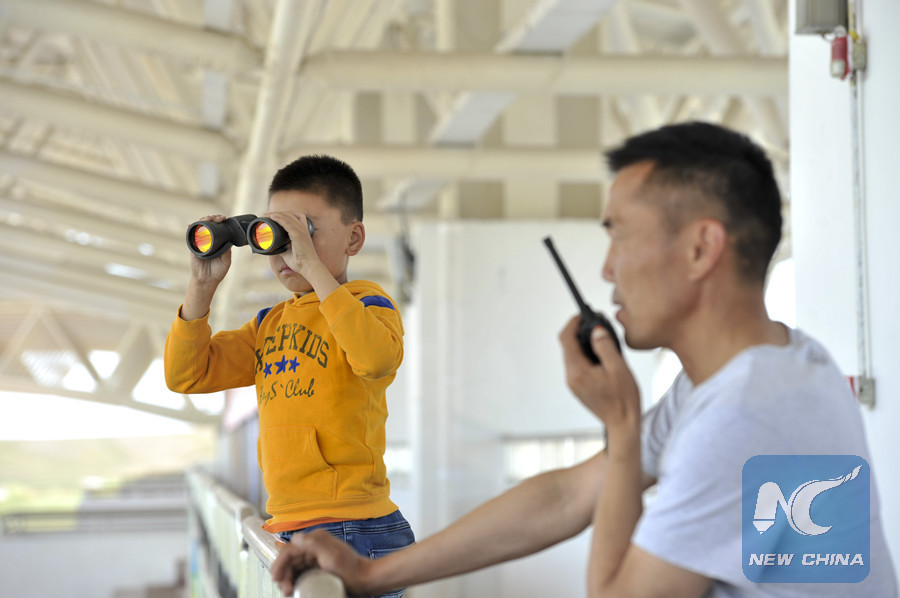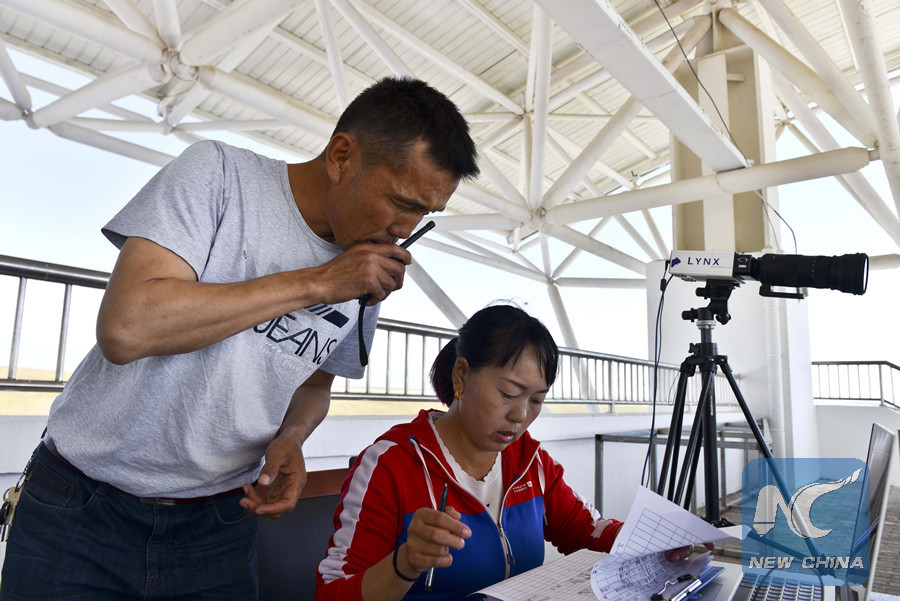
Bapa waves to audience. (Xinhua/Hu Huhu)
URUMQI, Sept. 29 (Xinhua) -- Retired champion jockey Bapa is back on horseback, but this time, a greater ambition spurs him on - he is pursuing not medals, but a prosperous and modern horse industry for his hometown.
Unlike in his prime, when he was one of the best jockeys in his club, the 41-year-old rider now performs in a daily show in Zhaosu County, northwest China's Xinjiang Uygur Autonomous Region.

Bapa performs acrobatics on horseback. (Xinhua/Hu Huhu)
Dressed in navy blue silk and a black helmet, Bapa rides a tall white Orlov trotter in a 10-minute horse parade, which is more like a model show of horses than a race. A dozen of horses of various famous breeds are introduced as they trot through the 500-meter racetrack. Then Bapa leaves the track to make way for riders who perform acrobatics on horseback.
He still misses those good old days when he dashed to the finish line. But he enjoys his current work all the same, because he views it as a way to promote the local horse industry.
That's why he returned home to the prairie from developed southern China.

Bapa watches other riders' performance on the stand. (Xinhua/Hu Huhu)
Bapa was born in an ethnic Mongolian herder's family in Zhaosu County, which boasts lush pastures and is home to Akhal-teke steeds, the most purebred horse in the world.
The well-known horse-breeding area also nurtures excellent equestrians, like Bapa, who left home at the age of 16 to become a top jockey in south China's metropolis of Guangzhou, capital of Guangdong Province, and later a coach and horse trainer in Shenzhen City, also in Guangdong, after he retired from the racetrack.
Zhaosu people have long been raising horses, but they received limited financial returns because most of the horses are draft horses, says Li Hai, an official in charge of horse industry development in Zhaosu.
Today, Zhaosu is determined to upgrade its horse tradition into a modern industry as an effort to boost local economy. Huge amount of funds have been spent in breed improvement, infrastructure construction and organizing equestrian events. The county also needs talented horse riders, like Bapa.
Bapa took up the challenge without hesitation. "Zhaosu is my home," he said. "Now, she has an opportunity, and I will definitely come back to her."

Bapa goes through old photos at home. On the table is a trophy he won in a national tournament this year. (Xinhua/Hu Huhu)
Bapa is back on the racetrack in a local ranch. He wants to attract a larger audience with his racing skills, as horse racing is a major part of the modern horse industry.
He has proven himself to be as a competent jockey as ever. He snatched several gold medals in national competitions and was honored as one of the best jockeys of Zhaosu County.
Bapa has taken part in hundreds of equestrian events of all levels in the first six years after he came back. But he has earned far less than before due to a lack of competition sponsors.
Bapa lives with it, because he does not compete for the money. He does it to inspire local herders to help develop a modern horse industry in the town.
"The better performance their horses achieve in races, the more money they can earn," he says. The price of a horse, after training and racing, can rise tenfold from 20,000 yuan (about 3,024 U.S. dollars) to 200,000 yuan.
Today, nearly every four out of 10 people participate in horse racing in Zhaosu, which has a population of less than 200,000.

Bapa (R) gives orders to performers via walkie-talkie on the stand while his son watches the show. (Xinhua/Hu Huhu)
After each horse parade, Bapa gets changed for his next performance in a temporary locker room constructed with steel plates.
"It is a bit shabby to be called 'a locker room,'" says Bapa, but there's still no denying the rapid development of the horse industry in Zhaosu.
"Five years ago it was just grassland here. Now we have racetracks of international standard, stands that can hold thousands of audience members, and timers with precision down to the millisecond. We also have more professional competitions," he noted.

Bapa works as a judge in a horse race while his wife (R) works as a technical official. (Xinhua/Hu Huhu)
Zhaosu is a part of a nationwide picture. As a traditionally horse-raising country, China has the world's third largest horse breeding stock. The modern horse industry, especially the horse racing industry, booms across the country. Herders need less draft livestock, while more race horses are kept and trained. Various equestrian competitions are held in different parts of China, including in Xinjiang.
Bapa is slightly overweight, which hinders his performance on the saddle. Now he spends more time in organizing equestrian events, coaching teenage riders and helping Xinjiang Agricultural University's research in the area of scientific horse training.
"Compared with those big cities, Zhaosu still has a long way to go," said Bapa. "I have a lot of work to do."

